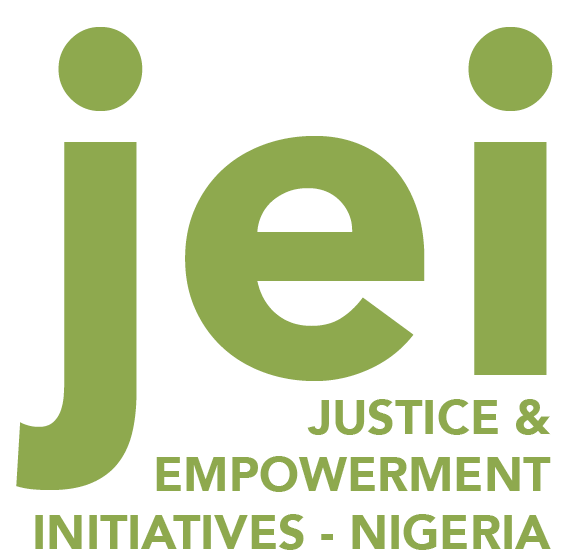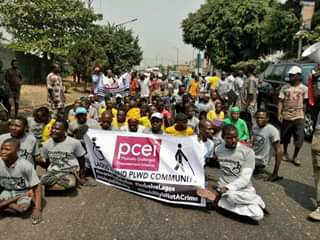Project
Upscaling Rights to Realities Initiative
-
Amount Funded
101,855 EUROProject Duration
01 Jul 2019 - 31 Dec 2020 -
-
Lead organisation
Partners
Physically Challenged Empowerment Initiative
-
The Community Legal Services Initiative is part of the Justice and Empowerment Initiative to empower poor and marginalised individuals to lead the changes that they would like to see in their own communities — whether greater access to justice for the poor, pro-poor urban governance and policy or community-led in-situ upgrading and development. They bring technical expertise in law, advocacy, urban planning, creative media, and community organising to inform, strengthen and support the Nigerian Slum / Informal Settlement Federation-led efforts to solve justice and development problems.
-
Organisation
The Community Legal Services Initiative is part of the Justice and Empowerment Initiative to empower poor and marginalised individuals to lead the changes that they would like to see in their own communities — whether greater access to justice for the poor, pro-poor urban governance and policy or community-led in-situ upgrading and development. They bring technical expertise in law, advocacy, urban planning, creative media, and community organising to inform, strengthen and support the Nigerian Slum / Informal Settlement Federation-led efforts to solve justice and development problems.
-
Project
Starting from Lagos, a grassroots network of persons with disabilities (PWDs) has come together in recent years to tackle systemic discrimination and human rights abuses they face as PWDs who are also ethnic/linguistic minorities in the city Arewas or persons from northern Nigeria. The grassroots network, called the Physically Challenged Empowerment Initiative (PCEI) has thousands of members from across Lagos, encompassing both people with physical disabilities as well as visual impairments.
Upscaling Rights to Realities Initiative is a graduation from the From Rights to Realities: Training Grassroots Network of PWD Paralegals to Access Services, an empowerment project in order to fully participate in urban planning which commenced in March 2018. JEI has been training two classes of urban poor PWDs and supporting them to render grassroots legal aid to their communities. These paralegals are educating their peers and defending them before the Lagos Mobile Court, assisting PWDs to register with the Lagos Office of Disability Affairs (LASODA) to access social entitlements, among others.
This influencing project builds on the early successes of the Empowerment Grant by providing trained urban poor PWD paralegals and other PCEI members with additional skills and tools to directly participate in urban planning and advocate for policy changes to build more inclusive Nigerian cities. As PCEI members move into new technical areas, JCEI leverages the natural alliance and foster the mutual support relationship between the PCEI network and the broader movement of the urban poor called the Nigerian Slum/Informal Settlement Federation, which already has teams of skilled grassroots volunteers in the three areas of endeavour into which PCEI wants to grow its efforts under this project:
(1) Using tablets and a mobile survey application, PCEI members work with the Federation#s profiling/data team to document their urban environment, capturing physical and non-physical barriers to their effective participation in the city. Maps of these barriers serve as jumping off-points for public conversations around accessibility of Nigerian cities to urban poor PWDs.
(2) Complementing the grassroots documentation of barriers, JEI trains a technical team of PCEI members focused on policy to assess and break down the various laws and policies affecting urban poor PWDs in Nigerian cities. This technical team works with the Federation’s policy advocacy team to formulate specific advocacy goals and develop and implement advocacy strategies to create more pro-poor and inclusive urban policy and planning.
(3) In support of the advocacy work and to create broader awareness and culture change of inclusion, PCEI members are trained and work with the Federation’s media team to create their own videos and audio pieces to bring the voices of urban poor PWDs into the halls of power and public venues across Nigerian cities to foster dialogue around urban inclusion.
(4) To tackle the push-factors that result in migration and trafficking of Arewa PWDs to Lagos from Northern Nigeria, PCEI members use the documentation, policy analysis, and media outputs in advocacy visits to government officials of the primary ‘sending’ states in Northern Nigeria.
-
-
Starting from Lagos, a grassroots network of persons with disabilities (PWDs) has come together in recent years to tackle systemic discrimination and human rights abuses they face as PWDs who are also ethnic/linguistic minorities in the city Arewas or persons from northern Nigeria. The grassroots network, called the Physically Challenged Empowerment Initiative (PCEI) has thousands of members from across Lagos, encompassing both people with physical disabilities as well as visual impairments.
Upscaling Rights to Realities Initiative is a graduation from the From Rights to Realities: Training Grassroots Network of PWD Paralegals to Access Services, an empowerment project in order to fully participate in urban planning which commenced in March 2018. JEI has been training two classes of urban poor PWDs and supporting them to render grassroots legal aid to their communities. These paralegals are educating their peers and defending them before the Lagos Mobile Court, assisting PWDs to register with the Lagos Office of Disability Affairs (LASODA) to access social entitlements, among others.
This influencing project builds on the early successes of the Empowerment Grant by providing trained urban poor PWD paralegals and other PCEI members with additional skills and tools to directly participate in urban planning and advocate for policy changes to build more inclusive Nigerian cities. As PCEI members move into new technical areas, JCEI leverages the natural alliance and foster the mutual support relationship between the PCEI network and the broader movement of the urban poor called the Nigerian Slum/Informal Settlement Federation, which already has teams of skilled grassroots volunteers in the three areas of endeavour into which PCEI wants to grow its efforts under this project:
(1) Using tablets and a mobile survey application, PCEI members work with the Federation#s profiling/data team to document their urban environment, capturing physical and non-physical barriers to their effective participation in the city. Maps of these barriers serve as jumping off-points for public conversations around accessibility of Nigerian cities to urban poor PWDs.
(2) Complementing the grassroots documentation of barriers, JEI trains a technical team of PCEI members focused on policy to assess and break down the various laws and policies affecting urban poor PWDs in Nigerian cities. This technical team works with the Federation’s policy advocacy team to formulate specific advocacy goals and develop and implement advocacy strategies to create more pro-poor and inclusive urban policy and planning.
(3) In support of the advocacy work and to create broader awareness and culture change of inclusion, PCEI members are trained and work with the Federation’s media team to create their own videos and audio pieces to bring the voices of urban poor PWDs into the halls of power and public venues across Nigerian cities to foster dialogue around urban inclusion.
(4) To tackle the push-factors that result in migration and trafficking of Arewa PWDs to Lagos from Northern Nigeria, PCEI members use the documentation, policy analysis, and media outputs in advocacy visits to government officials of the primary ‘sending’ states in Northern Nigeria.
- News




